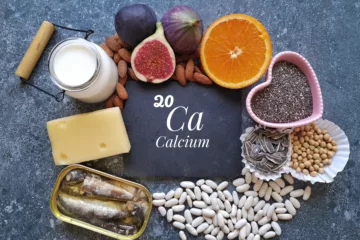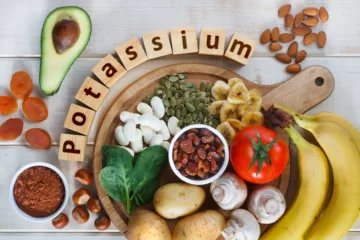Sulfur is an essential mineral that plays a vital role in maintaining overall health and wellness. It is a component of many amino acids, which are the building blocks of proteins. Sulfur is also involved in numerous metabolic processes and is required for the synthesis of collagen, hormones, and enzymes. In this article, we will discuss the importance of sulfur in our body, how to identify sulfur deficiency, and the top 10 foods high in sulfur.
Why is Sulfur Important for Our Health?
Sulfur is essential for maintaining the health of our skin, nails, and hair. It also helps with joint health and overall mobility. Sulfur is involved in the formation of connective tissues, which are important for the structure and integrity of various organs in our body, including our skin, bones, and cartilage. In addition, sulfur is known to have anti-inflammatory and antioxidant properties, which may help prevent chronic diseases.
Furthermore, sulfur plays a crucial role in the detoxification process of our body. It helps in the elimination of toxins and heavy metals, which can otherwise accumulate in our body and cause harm. Sulfur-containing compounds like glutathione are important for liver function and help in the removal of harmful substances from our body. Therefore, consuming foods rich in sulfur or taking sulfur supplements can aid in the detoxification process and promote overall health.
The Role of Sulfur in Our Body
Sulfur is involved in various metabolic processes, including the synthesis of glutathione, which is an antioxidant that protects our cells from oxidative stress. It is also required for the formation of taurine, which is involved in bile production and the maintenance of eye health. Sulfur is also involved in the production of insulin, which helps regulate blood sugar levels.
In addition to these important roles, sulfur also plays a crucial role in the structure and function of proteins. It is a component of amino acids, which are the building blocks of proteins. Sulfur-containing amino acids, such as cysteine and methionine, are essential for the formation of disulfide bonds, which help stabilize the structure of proteins. Sulfur is also involved in the regulation of gene expression and the function of enzymes.
How to Identify Sulfur Deficiency
Sulfur deficiency is rare because sulfur is found in many foods, and our body can also produce it. However, certain health conditions or a diet low in sulfur-rich foods can lead to a deficiency. Symptoms of sulfur deficiency may include joint pain, skin problems, fatigue, and weak nails.
If you suspect that you have a sulfur deficiency, it is important to consult with a healthcare professional for proper diagnosis and treatment. In addition to increasing your intake of sulfur-rich foods such as eggs, garlic, and cruciferous vegetables, your doctor may recommend supplements or other treatments to address the deficiency. It is also important to address any underlying health conditions that may be contributing to the deficiency.
Top 10 Foods High in Sulfur
Some of the best sources of sulfur include:
- Eggs: Eggs are an excellent source of sulfur, with two large eggs containing about 350mg of sulfur.
- Garlic: Garlic is rich in sulfur compounds, which are responsible for its distinctive odor and taste.
- Onions: Onions are a good source of sulfur, with one medium onion containing about 45mg of sulfur.
- Cruciferous Vegetables: Vegetables such as broccoli, cauliflower, and Brussels sprouts are great sources of sulfur compounds.
- Meat: Meat products such as beef, chicken, and fish are high in sulfur-containing amino acids.
- Dairy Products: Cheese, milk, and yogurt are also good sources of sulfur.
- Legumes: Legumes such as beans and lentils are an excellent source of sulfur.
- Nuts and Seeds: Nuts such as almonds and seeds such as pumpkin seeds are high in sulfur.
- Whole Grains: Whole grains such as brown rice and oats are also good sources of sulfur.
- Asparagus: Asparagus is a good source of sulfur-containing amino acids.
Sulfur is an essential mineral that plays a vital role in many bodily functions. It is necessary for the production of collagen, which is essential for healthy skin, hair, and nails. Sulfur also helps to detoxify the liver and improve digestion. In addition to the foods listed above, other sources of sulfur include cruciferous vegetables like kale and cabbage, and fruits like bananas and pineapples. However, it is important to note that consuming too much sulfur can lead to negative side effects, such as digestive issues and skin rashes. It is recommended to consume sulfur in moderation and as part of a balanced diet.
Vegetables Rich in Sulfur Compounds
Some vegetables that are particularly rich in sulfur compounds include:
- Brussels Sprouts: Brussels sprouts are rich in sulfur-containing compounds, including glucosinolates.
- Kale: Kale is a cruciferous vegetable that is rich in sulfur and other nutrients, including vitamin C and vitamin K.
- Cauliflower: Like other cruciferous vegetables, cauliflower contains sulfur compounds such as glucosinolates, which may have anti-cancer properties.
- Cabbage: Cabbage is also rich in sulfur and other antioxidants, which may help protect against chronic diseases.
Other vegetables that are also rich in sulfur compounds include:
- Garlic: Garlic is known for its pungent flavor and strong odor, but it is also rich in sulfur compounds that may have health benefits, such as reducing inflammation and improving heart health.
- Onions: Onions are another vegetable that is high in sulfur compounds, which may help lower blood pressure and reduce the risk of certain cancers.
- Broccoli: Broccoli is a cruciferous vegetable that is not only rich in sulfur compounds, but also contains other nutrients such as vitamin C, fiber, and folate.
- Radishes: Radishes are a root vegetable that are often used in salads and have a peppery flavor. They are also a good source of sulfur compounds and vitamin C.
Benefits of Consuming Foods High in Sulfur
Consuming sulfur-rich foods has numerous health benefits. Some of the most significant benefits include:
- Improved Joint Health: Sulfur helps to support joint health and reduce inflammation, which can alleviate joint pain and stiffness.
- Healthier Skin and Hair: Sulfur is involved in the synthesis of collagen and keratin, which help maintain healthy skin and hair.
- Detoxification: Sulfur-containing compounds such as glutathione help to protect against cellular damage caused by toxins.
- Reduced Risk of Chronic Diseases: Sulfur-containing compounds have been shown to have anti-inflammatory and antioxidant properties, which may help prevent chronic diseases such as heart disease and cancer.
In addition to the above benefits, consuming sulfur-rich foods can also improve digestion. Sulfur helps to stimulate the production of digestive enzymes, which can aid in the breakdown and absorption of nutrients from food. This can lead to better overall digestive health and may even help alleviate symptoms of digestive disorders such as bloating and constipation.
The Best Ways to Cook and Consume Foods High in Sulfur
Sulfur is a relatively stable nutrient, and cooking methods such as roasting, boiling, or steaming will not significantly decrease its content. To get the most sulfur from your food, it is important to eat a varied diet that includes a mix of sulfur-rich foods. You can also take supplements containing MSM (methylsulfonylmethane), which is a sulfur-containing compound that has been shown to have various health benefits.
Some of the best sulfur-rich foods include garlic, onions, cruciferous vegetables like broccoli and cauliflower, eggs, and meat. These foods not only provide sulfur, but also other important nutrients like vitamins and minerals. It is important to note that some people may be sensitive to sulfur-containing foods and may experience digestive issues or other symptoms. If you experience any discomfort after consuming sulfur-rich foods, it is best to consult with a healthcare professional.
In addition to consuming sulfur-rich foods, you can also incorporate sulfur into your skincare routine. Sulfur has been shown to have anti-inflammatory and antibacterial properties, making it a great ingredient for treating acne and other skin conditions. Look for skincare products that contain sulfur, or try a sulfur mask or spot treatment to see if it works for your skin.
Potential Risks of Consuming Too Much Sulfur
While sulfur is essential for good health, consuming too much may have adverse effects. Excessive intake of sulfur can cause digestive problems such as gas, bloating, and diarrhea. It may also lead to an imbalance in the gut microbiome, which could have long-term health effects.
In addition to digestive issues, excessive sulfur intake may also lead to skin problems such as rashes and acne. This is because sulfur is involved in the production of collagen, which is essential for healthy skin. However, too much sulfur can disrupt the balance of collagen production, leading to skin problems.
Furthermore, consuming high levels of sulfur may also affect the thyroid gland. Sulfur can interfere with the absorption of iodine, which is necessary for the proper functioning of the thyroid gland. This can lead to thyroid problems such as hypothyroidism or goiter.
How to Incorporate More Sulfur-rich Foods into Your Diet
If you want to incorporate more sulfur-rich foods into your diet, some simple tips include:
- Include a variety of sulfur-rich foods in your meals, such as meat, eggs, dairy, vegetables, and grains.
- Try new recipes that feature sulfur-rich ingredients, such as garlic or cruciferous vegetables.
- Snack on sulfur-rich foods such as nuts and seeds.
It’s important to note that sulfur is an essential mineral that plays a vital role in many bodily functions, including the production of collagen, which is important for healthy skin, hair, and nails. Sulfur also helps to detoxify the liver and supports the immune system. By incorporating more sulfur-rich foods into your diet, you can help to ensure that your body is getting the nutrients it needs to function at its best.
Plant-based Sources of Sulfur for Vegetarians and Vegans
If you are following a plant-based diet, some excellent sources of sulfur include legumes, grains, nuts, and seeds. Vegetables such as broccoli, cauliflower, and kale are also good options.
It is important to note that sulfur is an essential mineral that plays a crucial role in many bodily functions, including the formation of proteins, enzymes, and connective tissues. Sulfur also helps to maintain healthy skin, hair, and nails. While sulfur is found in many animal-based foods, such as meat, fish, and eggs, vegetarians and vegans can still obtain adequate amounts of sulfur from plant-based sources.
Comparison of Plant-based vs. Animal-based Sources of Sulfur
While both plant-based and animal-based foods contain sulfur, animal-based sources tend to be richer in sulfur-containing amino acids such as methionine and cysteine. However, plant-based sources offer a range of other nutrients that are beneficial for good health, such as fiber, vitamins, and minerals.
Plant-based sources of sulfur include cruciferous vegetables like broccoli, cauliflower, and kale, as well as legumes like lentils and chickpeas. These foods not only provide sulfur, but also offer a variety of antioxidants and anti-inflammatory compounds that can help reduce the risk of chronic diseases.
On the other hand, animal-based sources of sulfur include meat, fish, and dairy products. While these foods are high in sulfur-containing amino acids, they are also often high in saturated fat and cholesterol, which can increase the risk of heart disease and other health problems. It is important to balance the intake of plant-based and animal-based sources of sulfur to ensure a healthy and well-rounded diet.
Can Consuming Foods High in Sulfur Help with Skin and Hair Health?
Consuming foods high in sulfur can help maintain healthy skin and hair. Sulfur is a component of keratin, which is a protein that is essential for healthy hair and nails. Sulfur also plays a role in collagen synthesis, which helps to keep skin looking youthful and healthy.
In addition to its benefits for skin and hair health, sulfur also has anti-inflammatory properties that can help reduce inflammation in the body. This can be particularly beneficial for individuals with conditions such as arthritis or asthma. Some foods that are high in sulfur include garlic, onions, eggs, and cruciferous vegetables such as broccoli and cauliflower.
The Link Between Sulfur and Detoxification
Sulfur-containing compounds such as glutathione are essential for the detoxification of harmful substances in our body. Glutathione helps to eliminate toxins such as heavy metals and pollutants, which can cause cellular damage and lead to chronic diseases.
Furthermore, sulfur is also important for the production of enzymes that aid in the detoxification process. These enzymes, such as sulfite oxidase and sulfotransferase, help to break down and eliminate toxins from the body. Without sufficient sulfur, the body may struggle to effectively detoxify and eliminate harmful substances, leading to a buildup of toxins and potential health issues.
How to Store Sulfur-rich Foods for Optimal Nutrition Benefits
To get the most nutrition from your sulfur-rich foods, it is important to store them properly. Vegetables such as broccoli and cauliflower should be stored in the refrigerator; otherwise, they may become wilted and less nutritious. Eggs and dairy products should also be stored in the refrigerator to prevent spoilage. Nuts and seeds can be stored in a cool, darkplace in an airtight container.
Another important sulfur-rich food that requires proper storage is garlic. Garlic should be stored in a cool, dry place away from direct sunlight. If stored properly, garlic can last for several months and retain its nutritional benefits. Onions, another sulfur-rich vegetable, should also be stored in a cool, dry place away from direct sunlight. However, unlike garlic, onions should not be stored in the refrigerator as the moisture can cause them to spoil faster.
It is also important to note that cooking sulfur-rich foods can affect their nutritional benefits. Overcooking vegetables such as broccoli and cauliflower can cause them to lose their sulfur compounds and other nutrients. To retain the most nutrition, it is recommended to lightly steam or sauté these vegetables. Similarly, overcooking eggs can cause them to lose some of their nutritional value. Soft-boiling or poaching eggs can help retain their nutrients.
Final Thoughts
Sulfur is an essential mineral that plays an important role in our overall health and wellness. Consuming a varied diet that includes sulfur-rich foods such as meat, vegetables, and grains can help promote good health and prevent chronic diseases. While excessive intake of sulfur may have adverse effects, incorporating sulfur-rich foods into your meals in moderation can have numerous benefits for your health and wellbeing.
One of the most important benefits of sulfur is its ability to support healthy skin. Sulfur is a key component of collagen, which is essential for maintaining the elasticity and firmness of our skin. Additionally, sulfur has been shown to have anti-inflammatory properties, which can help reduce redness and irritation in the skin.
Another benefit of sulfur is its role in detoxification. Sulfur is a key component of glutathione, a powerful antioxidant that helps remove toxins from the body. By consuming sulfur-rich foods, you can support your body’s natural detoxification processes and help protect against oxidative stress and damage.










